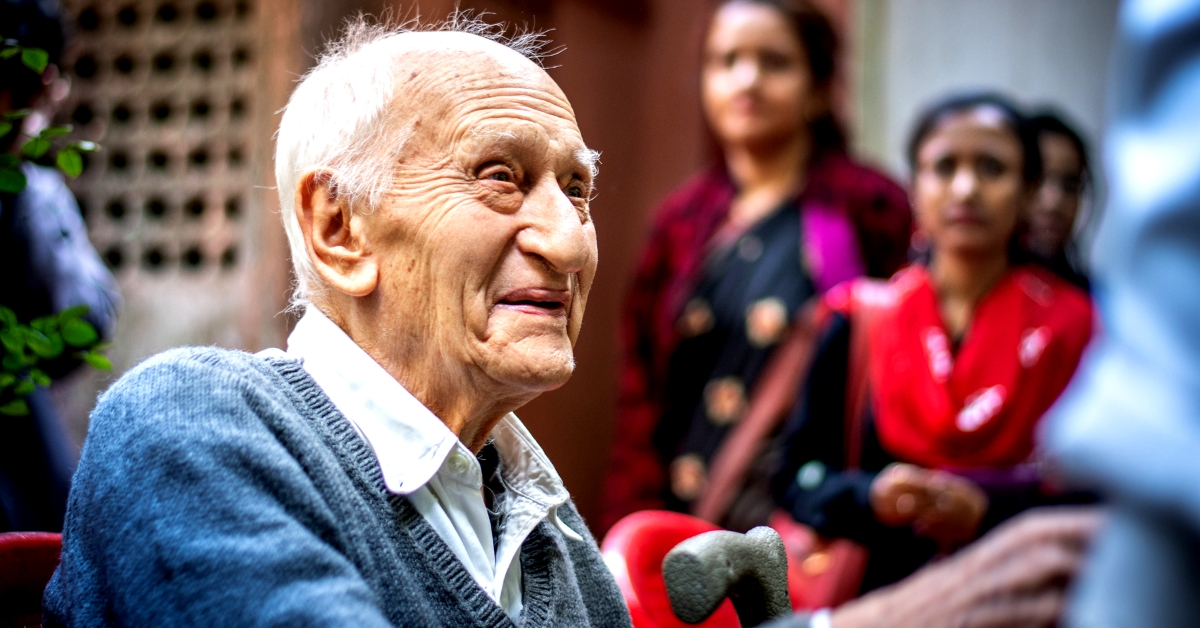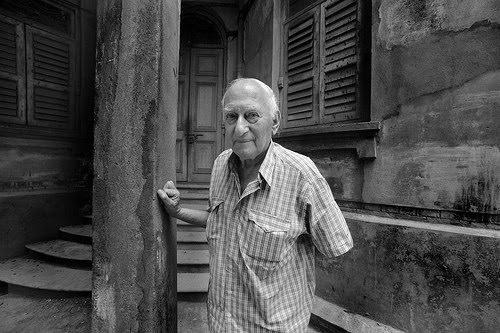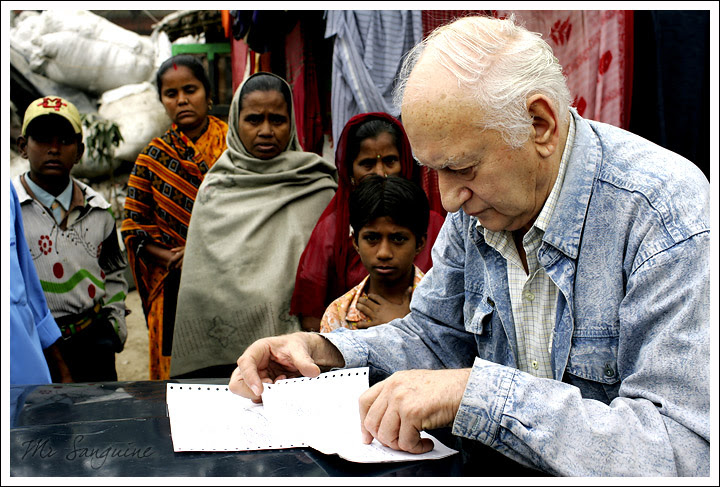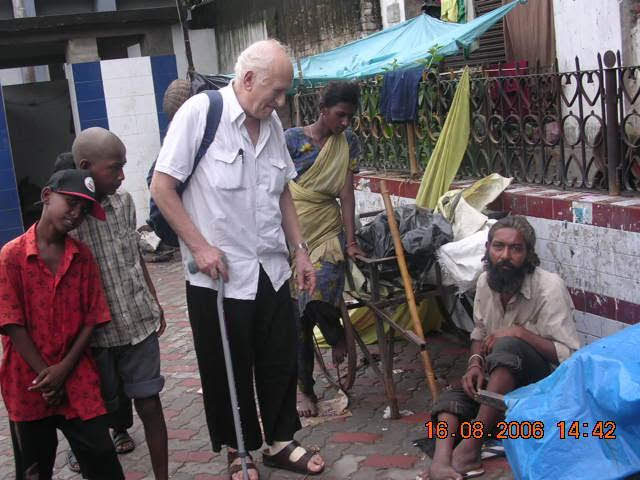Jack Preger: The British Pavement Doctor Who Spent 40 Years Treating Kolkata’s Poor
“I’m comfortable that I’m leaving Calcutta Rescue in good hands. I’m incapable of running it. We have a Governing Council and a CEO. I’m happy to go. There’s an old German saying that everything has an end. Except the sausage, which has two. The Germans are very fond of sausages,” quips the doctor.

His eyesight failing and his luggage filled with nothing but a lamp and a picture of Scotland’s Iona island, an 88-year-old doctor bids farewell to all his friends and well-wishers in Kolkata. Dr Jack Preger has a flight to catch. He is off to the UK but he won’t leave without distributing the last of his possessions to the people living on the streets of Kolkata. Giving away blankets and clothes to those who cannot afford to buy them, the doctor receives flowers in return.
Today, he bids farewell to the city he had called his home for the last four decades.
Although Kolkata had not been his first choice in his desire to serve people yet Dr Preger made sure that in his time here, he helped as many as could—over half a million—to get optimum health care, education and opportunities to turn their life around in a meaningful way. The life stories of certain people are simply awe-inspiring and that of Dr Preger—from being a farmer in Wales to a ‘street-doctor’ in Kolkata—is one such amazing story.
From Wales to West Bengal

Jack Preger was born in Manchester in 1930. While pursuing a course in economics and political science at the prestigious Oxford University, his tutor got him interested in third-world economic development. After completing his studies, Preger ran a cliff-side farm in Wales for about eight years.
But Preger could not forget what he had learnt about the lives of people living third-world nations.
One day, while running a tractor through his fields, he suddenly made a decision to pursue medicine and be of service to people in need. And within a couple of weeks, the 35-year-old economist had sold his farm and enrolled in the Royal College of Surgeons in Ireland!
His aim was to work in ‘Third World Situations’ but India was not exactly on his mind.
“My first choice Latin America. When I was working in Ireland, there was an appeal from Concern, [an] Irish NGO, for nurses and doctors to come here [India]. So I answered the appeal. They had started work in the area where refugees arrived from Bangladesh during the 1971 war. They say there were 10 million refugees. There was a big camp in Salt Lake. Then, after the surrender of Pakistan, Concern went to Bangladesh. At that time, I had been working in the Bihari refugee camps,” the doctor writes.
When he arrived in Bangladesh and started his work, the doctor saw the many evils that were haunting the citizens there. The war may have been over at the border, yet the people living in the country had other battles to fight.
Many social organisations worked hand in glove with the powerful and corrupt governmental authorities to run a child-trafficking racket. They did not tolerate Preger’s interference and soon, he was asked to leave Bangladesh for good.
But instead of taking a flight back home, the compassionate and determined doctor decided to shift his medical practice to India. He had already learnt Bangla and Urdu, and so West Bengal seemed like a good place to restart his efforts.
A doctor of his kind
“When I started working in Bangladesh with refugees, they had been thrown out of everything in Dhaka. They had lost their homes and businesses. Been thrown out of college and school. They’d lost everything. They were living in camps, in the town hall, and each family had a little area surrounded by bricks. A few people had given up and had gone mute. They wouldn’t speak. They couldn’t relate to anything, having experienced that suffering. People here are not in that situation. That was a war situation. But the refugees had a certain resilience to try and keep a family together, and it’s the same here in the bustees (slums). So I think that’s the best thing I’ve found in Kolkata.”
In 1979, Preger started helping the marginalised communities in Kolkata by treating “the sick and the injured where they lay- under bridges, on railway platforms and in drainage pipes.” Here too, his motives to help Indians were questioned by authorities and a number of legal details were continuously brought up in order to harass him.
Preger was even jailed for a brief period of time but through it all, he persevered to help Kolkata’s poor.

As more and more people started spotting a westerner helping beggars and day-wage labourers in the state capital, they extended help in their own capacity. Some provided funds and others volunteered to join his efforts. Soon enough, Preger had formed Calcutta Rescue (CR) – an organised effort to bring together philanthropists and those who needed their help.
A tiny one-room apartment in Girish Park—once a brothel—became his home. The Bengali humour and the tenacity of the poor to live life as it comes made him quite fond of the people. His empathetic nature coupled with his affection for Bengal’s common public motivated him to help anyone who needed it. Those who knocked on his doors, dissatisfied with the government hospitals or a beggar on a footpath who looked too weak to not be ill—he welcomed all.
Preger discovered a deadly disease that had a stigma attached to it worldwide. Yet the doctor knew it had to taken care of on an urgent basis.
Jennifer Baskerville, who works with CR spoke to The Better India about Preger’s phenomenal work here. “He identified that HIV would become a major health problem in India long before most people and began researching the most effective treatments that were being used in other parts of the world. And for many years his charity, Calcutta Rescue, was the only organisation offering free HIV treatment in West Bengal. This saved the lives of many poor people and allowed them to go on living normally.”
CR was officially registered as a non-governmental organisation in 1991 and that’s when the scale of Dr Preger’s efforts escalated to reach thousands of Kolkata’s deprived.
Calcutta Rescue

CR, which has helped over 500,000 people in Kolkata, is one of the most beloved organisations in the city. Although, as Preger points out, there is a very wide social divide between the rich and the poor in Kolkata, the holistic efforts of CR are improving lives at an unchallenged scale.
The CR works for, “healthcare, education and support to some of the very poorest people in Kolkata and West Bengal,” says Jennifer. “Most of our beneficiaries live in slums within the city and either beg for money or try to look after their family by working on building sites or as cleaners or cooks . . . We take a holistic approach—not just treating the immediate problems faced by our patients, but doing what we can to improve their lives and help them out of poverty. This might involve referring them to other organisations, providing health education or giving them food supplements or travel expenses to attend a clinic,” she adds.
You may also like: Solapur to China: The Forgotten Story of the Indian Doctor Revered by the Chinese
Take last year’s numbers for example. CR provided healthcare to over 17000 people, supported the education of 700 children and provided clean drinking water to 1500 families. With 150 local staff members and thousands of supporters from across the world, CR spends close to 6.5 crore rupees every year for the welfare of the underprivileged.
Although 10 per cent of this money is spent in administration, the rest is utilised to help the poor.
For their relentless efforts in Bengal, CR was named the “joint best medium-sized charity” at the Indian NGO awards in 2009. Dr Jack, who was until very recently an active member of the organisation, became the first living non-Asian to win the prestigious Asian Awards in 2017!
The journey of 40 years comes to an end

Taking an “early retirement” at the age of 88, Dr Jack Preger bid goodbye to the City of Joy in January this year. “I’m comfortable that I’m leaving Calcutta Rescue in good hands. I’m incapable of running it. We have a Governing Council and a CEO. I’m happy to go. There’s an old German saying that everything has an end. Except the sausage, which has two. The Germans are very fond of sausages,” he writes.
You may also like: Every Week, Odisha Doctor Walks for Kilometers to Ensure Tribals Get Medical Care!
CR continues to do the amazing work that was pioneered by Jack Preger. “He never gave up on a cause that he believed in. Decades after he exposed the child-smuggling ring in Bangladesh he was still trying to find the missing children and raising their plight in the press whenever he could. He always put the needs of the poor before his own comfort and inspired so many people by his example. He also has a great sense of humour which he never lost, however hard life was for him,” Jennifer says.
Taking a lamp and a print, both gifts from his well-wishers and a million memories to last him a lifetime, Dr Preger bids goodbye to Kolkata. Kolkata, we are sure, waved him a teary but grateful goodbye.
(Edited by Saiqua Sultan)
Like this story? Or have something to share?
Write to us: [email protected]
Connect with us on Facebook and Twitter.
#mc_embed_signup{background:#fff; clear:left; font:14px Helvetica,Arial,sans-serif; }
/* Add your own Mailchimp form style overrides in your site stylesheet or in this style block.
We recommend moving this block and the preceding CSS link to the HEAD of your HTML file. */
Find Out What’s Good Today – Sign Up Now!

Similar Story

Would Your Parents Support You Taking Therapy? This Mental Wellbeing Survey Reveals an Unseen Change
An ITC Fiama survey on mental health shows 80% of Indians trust their parents to back them in seeking therapy, signalling a change in how its perceived by Gen Z, millennials, and their parents.
Read more >
If you found our stories insightful, informative, or even just enjoyable, we invite you to consider making a voluntary payment to support the work we do at The Better India. Your contribution helps us continue producing quality content that educates, inspires, and drives positive change.
Choose one of the payment options below for your contribution-
By paying for the stories you value, you directly contribute to sustaining our efforts focused on making a difference in the world. Together, let's ensure that impactful stories continue to be told and shared, enriching lives and communities alike.
Thank you for your support. Here are some frequently asked questions you might find helpful to know why you are contributing?


This story made me
-
97
-
121
-
89
-
167












